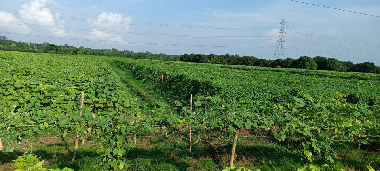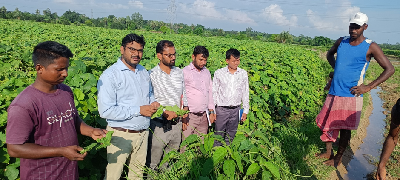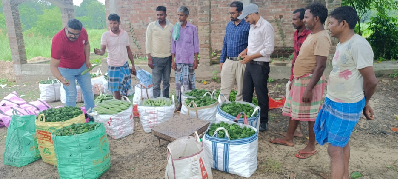Turning a Seasonal Crisis into Opportunity
The monsoon season brings lush greenery to the Indian countryside but, paradoxically, often triggers a shortage of fresh vegetables. Prices of staples like bitter gourd, ridge gourd, sponge gourd, pumpkin, and pointed gourd escalate sharply, making them a costly luxury for many households.

In Malda district of West Bengal blessed with fertile soil and ample water vegetable farming historically remained fragmented and insufficient to meet rising demand. This changed in 2023, thanks to targeted interventions under the Scheduled Caste Sub-Plan (SCSP) facilitated by ICAR-Indian Sugercane Research Institute Lucknow, ICAR–Central Institute for Subtropical Horticulture, Lucknow, and ICAR-Agricultural Technology Application Research Institute, Kolkata. Seizing the opportunity, ICAR-KVK (CISH) Malda, under the guidance of ICAR-ATARI Kolkata, launched a mission in Gazole block to transform scattered cultivation into organized, technology-driven vegetable clusters. The initiative was built on modern techniques, farmer training, and robust market linkages empowering SC farmers both economically and socially.
Strategic Interventions: Building Clusters of Prosperity
KVK Malda identified seven promising villages including Chandandighi, Buju Bitha, and Adina for rainy-season vegetable cultivation. These locations offered sandy loam soils, reliable irrigation sources, and proximity to major transport routes, making them ideal for cluster-based horticulture growth.

Key interventions included:
• Training & Capacity Building: Over 350 SC farmers trained in integrated pest management (IPM), balanced nutrient use, and crop trellising. Chandandighi was developed as a live demonstration hub.
• Cluster Development: Cultivation expanded from scattered patches to more than 200 hectares of cucurbits.
• Youth & Women Engagement: Shade-net houses set up in four villages through Self-Help Groups (SHGs), producing 31,200 seedlings every 45 days. These enterprises generated ₹60,000 per cycle for each 10-member group.
• Sustainable Pest Management: Over 200 farmers adopted IPM Kits containing traps, bio-pesticides, and microbial agents cutting pesticide costs by 40–50% while enhancing crop health.
Economic Gains: From Farms to Markets
The transformation is evident across 266 hectares of vegetable cultivation in Gazole block, contributing ₹5.58 crore in farm-gate value. Cucurbits alone account for ₹3.94 crore, with KVK interventions adding an extra ₹55.8–83.7 lakh despite covering only 10–15% of the cultivated area.

Village-level performance reinforces the success:
• Chandandighi expanded to 77 hectares of vegetables.
• Fullbari and Shivirpara reached 30 and 25 hectares respectively.
Direct market linkages to Kolkata, Dhanbad, and Ranchi have ensured better prices, strengthened supply chains, and reduced dependence on local mandis.
Impact Highlights
• 200 hectares brought under cucurbit cultivation involving 350 SC farmers.
• Youth-led shade-net enterprises provide continuous seedling supply.
• IPM adoption reduced costs by 40–50%, boosting net incomes.
• Market outreach extended beyond local mandis to high-value urban centers.
• Women empowered through SHG-driven agri-entrepreneurship.
Challenges and the Road Ahead
Despite success, farmers still face challenges like fruit fly and leaf curl infestations, and limited irrigation coverage. To overcome these, KVK Malda is promoting diversification into tomato, capsicum, and beans, introducing drip and solar irrigation, and encouraging organic clusters to cut chemical costs.
Policy Synergy: Aligning with National Priorities
The Union Budget 2024’s emphasis on vegetable clusters aligns with KVK Malda’s efforts. With proper investment the district can develop 4–5 vegetable hubs covering 1000+ hectares. This would stabilize prices, reduce fertilizer subsidies, ensure nutritional security and create employment for local communities.

A Replicable Model of Change
The Malda vegetable cluster initiative showcases how science-led interventions, inclusive farmer engagement, and market integration can convert seasonal crises into economic opportunities. Beyond delivering year-round vegetable availability, the model enhances nutrition security, stabilizes rural incomes, and nurtures agri-entrepreneurship.
With sustained policy backing and institutional support, this framework can be replicated across eastern India, emerging as a flagship example of how ICAR and the Government of India are advancing farmer-centric, sustainable, and inclusive agricultural transformation.
(Source: ICAR- Agricultural Technology Application Research Institute, Kolkata)








Like on Facebook
Subscribe on Youtube
Follow on X X
Like on instagram